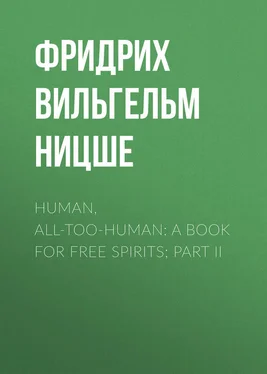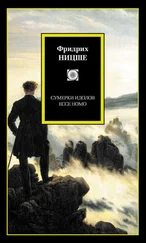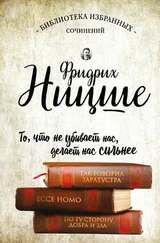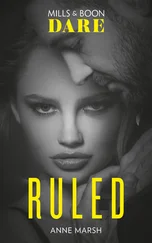Фридрих Ницше - Human, All-Too-Human - A Book For Free Spirits; Part II
Здесь есть возможность читать онлайн «Фридрих Ницше - Human, All-Too-Human - A Book For Free Spirits; Part II» — ознакомительный отрывок электронной книги совершенно бесплатно, а после прочтения отрывка купить полную версию. В некоторых случаях можно слушать аудио, скачать через торрент в формате fb2 и присутствует краткое содержание. Жанр: Философия, literature_19, foreign_antique, foreign_prose, на английском языке. Описание произведения, (предисловие) а так же отзывы посетителей доступны на портале библиотеки ЛибКат.
- Название:Human, All-Too-Human: A Book For Free Spirits; Part II
- Автор:
- Жанр:
- Год:неизвестен
- ISBN:нет данных
- Рейтинг книги:3 / 5. Голосов: 1
-
Избранное:Добавить в избранное
- Отзывы:
-
Ваша оценка:
- 60
- 1
- 2
- 3
- 4
- 5
Human, All-Too-Human: A Book For Free Spirits; Part II: краткое содержание, описание и аннотация
Предлагаем к чтению аннотацию, описание, краткое содержание или предисловие (зависит от того, что написал сам автор книги «Human, All-Too-Human: A Book For Free Spirits; Part II»). Если вы не нашли необходимую информацию о книге — напишите в комментариях, мы постараемся отыскать её.
Human, All-Too-Human: A Book For Free Spirits; Part II — читать онлайн ознакомительный отрывок
Ниже представлен текст книги, разбитый по страницам. Система сохранения места последней прочитанной страницы, позволяет с удобством читать онлайн бесплатно книгу «Human, All-Too-Human: A Book For Free Spirits; Part II», без необходимости каждый раз заново искать на чём Вы остановились. Поставьте закладку, и сможете в любой момент перейти на страницу, на которой закончили чтение.
Интервал:
Закладка:
The Muse as Penthesilea. 9– “Better to rot than to be a woman without charm.” When once the Muse thinks thus, the end of her art is again at hand. But it can be a tragic and also a comic finale.
The Circuitous Path to the Beautiful. – If the beautiful is to be identified with that which gives pleasure – and thus sang the Muses once – the useful is often the necessary circuitous path to the beautiful, and has a perfect right to spurn the short-sighted censure of men who live for the moment, who will not wait, and who think that they can reach all good things without ever taking a circuitous path.
An Excuse for many a Transgression. – The ceaseless desire to create, the eternal looking outward of the artist, hinders him from becoming better and more beautiful as a personality: unless his craving for glory be great enough to compel him to exhibit in his relations with other men a growth corresponding to the growing beauty and greatness of his works. In any case he has but a limited measure of strength, and how could the proportion of strength that he spends on himself be of any benefit to his work – or vice versa ?
Satisfying the Best People. – If we have satisfied the best people of our time with our art, it is a sign that we shall not satisfy the best people of the succeeding period. We have indeed “lived for all time,” and the applause of the best people ensures our fame. 10
Of One Substance. – If we are of one substance with a book or a work of art, we think in our heart of hearts that it must be excellent, and are offended if others find it ugly, over-spiced, or pretentious.
Speech and Emotion. – That speech is not given to us to communicate our emotions may be seen from the fact that all simple men are ashamed to seek for words to express their deeper feelings. These feelings are expressed only in actions, and even here such men blush if others seem to divine their motives. After all, among poets, to whom God generally denies this shame, the more noble are more monosyllabic in the language of emotion, and evince a certain constraint: whereas the real poets of emotion are for the most part shameless in practical life.
A Mistake about a Privation. – He that has not for a long time been completely weaned from an art, and is still always at home in it, has no idea how small a privation it is to live without that art.
Three-quarter Strength. – A work that is meant to give an impression of health should be produced with three-quarters, at the most, of the strength of its creator. If he has gone to his farthest limit, the work excites the observer and disconcerts him by its tension. All good things have something lazy about them and lie like cows in the meadow.
Refusing to have Hunger as a Guest. – As refined fare serves a hungry man as well as and no better than coarser food, the more pretentious artist will not dream of inviting the hungry man to his meal.
Living without Art and Wine. – It is with works of art as with wine – it is better if one can do without both and keep to water, and if from the inner fire and inner sweetness of the soul the water spontaneously changes again into wine.
The Pirate-Genius. – The pirate-genius in art, who even knows how to deceive subtle minds, arises when some one unscrupulously and from youth upwards regards all good things, that are not protected by law, as the property of a particular person, as his legitimate spoil. Now all the good things of past ages and masters lie free around us, hedged about and protected by the reverential awe of the few who know them. To these few our robber-genius, by the force of his impudence, bids defiance and accumulates for himself a wealth that once more calls forth homage and awe.
To the Poets of Great Towns. – In the gardens of modern poetry it will clearly be observed that the sewers of great towns are too near. With the fragrance of flowers is mingled something that betrays abomination and putrescence. With pain I ask: “Must you poets always request wit and dirt to stand godfather, when an innocent and beautiful sensation has to be christened by you? Are you obliged to dress your noble goddess in a hood of devilry and caricature? But whence this necessity, this obligation?” The reason is – because you live too near the sewers.
Of the Salt of Speech. – No one has ever explained why the Greek writers, having at command such an unparalleled wealth and power of language, made so sparing a use of their resources that every post-classical Greek book appears by comparison crude, over-coloured, and extravagant. It is said that towards the North Polar ice and in the hottest countries salt is becoming less and less used, whereas on the other hand the dwellers on the plains and by the coast in the more temperate zones use salt in great abundance. Is it possible that the Greeks from a twofold reason – because their intellect was colder and clearer but their fundamental passionate nature far more tropical than ours – did not need salt and spice to the same extent that we do?
The Freest Writer. – In a book for free spirits one cannot avoid mention of Laurence Sterne, the man whom Goethe honoured as the freest spirit of his century. May he be satisfied with the honour of being called the freest writer of all times, in comparison with whom all others appear stiff, square-toed, intolerant, and downright boorish! In his case we should not speak of the clear and rounded but of “the endless melody” – if by this phrase we arrive at a name for an artistic style in which the definite form is continually broken, thrust aside and transferred to the realm of the indefinite, so that it signifies one and the other at the same time. Sterne is the great master of double entendre , this phrase being naturally used in a far wider sense than is commonly done when one applies it to sexual relations. We may give up for lost the reader who always wants to know exactly what Sterne thinks about a matter, and whether he be making a serious or a smiling face (for he can do both with one wrinkling of his features; he can be and even wishes to be right and wrong at the same moment, to interweave profundity and farce). His digressions are at once continuations and further developments of the story, his maxims contain a satire on all that is sententious, his dislike of seriousness is bound up with a disposition to take no matter merely externally and on the surface. So in the proper reader he arouses a feeling of uncertainty whether he be walking, lying, or standing, a feeling most closely akin to that of floating in the air. He, the most versatile of writers, communicates something of this versatility to his reader. Yes, Sterne unexpectedly changes the parts, and is often as much reader as author, his book being like a play within a play, a theatre audience before another theatre audience. We must surrender at discretion to the mood of Sterne, although we can always expect it to be gracious. It is strangely instructive to see how so great a writer as Diderot has affected this double entendre of Sterne's – to be equally ambiguous throughout is just the Sternian super-humour. Did Diderot imitate, admire, ridicule, or parody Sterne in his Jacques le Fataliste ? One cannot be exactly certain, and this uncertainty was perhaps intended by the author. This very doubt makes the French unjust to the work of one of their first masters, one who need not be ashamed of comparison with any of the ancients or moderns. For humour (and especially for this humorous attitude towards humour itself) the French are too serious. Is it necessary to add that of all great authors Sterne is the worst model, in fact the inimitable author, and that even Diderot had to pay for his daring? What the worthy Frenchmen and before them some Greeks and Romans aimed at and attained in prose is the very opposite of what Sterne aims at and attains. He raises himself as a masterly exception above all that artists in writing demand of themselves – propriety, reserve, character, steadfastness of purpose, comprehensiveness, perspicuity, good deportment in gait and feature. Unfortunately Sterne the man seems to have been only too closely related to Sterne the writer. His squirrel-soul sprang with insatiable unrest from branch to branch; he knew what lies between sublimity and rascality; he had sat on every seat, always with unabashed watery eyes and mobile play of feature. He was – if language does not revolt from such a combination – of a hard-hearted kindness, and in the midst of the joys of a grotesque and even corrupt imagination he showed the bashful grace of innocence. Such a carnal and spiritual hermaphroditism, such untrammelled wit penetrating into every vein and muscle, was perhaps never possessed by any other man.
Читать дальшеИнтервал:
Закладка:
Похожие книги на «Human, All-Too-Human: A Book For Free Spirits; Part II»
Представляем Вашему вниманию похожие книги на «Human, All-Too-Human: A Book For Free Spirits; Part II» списком для выбора. Мы отобрали схожую по названию и смыслу литературу в надежде предоставить читателям больше вариантов отыскать новые, интересные, ещё непрочитанные произведения.
Обсуждение, отзывы о книге «Human, All-Too-Human: A Book For Free Spirits; Part II» и просто собственные мнения читателей. Оставьте ваши комментарии, напишите, что Вы думаете о произведении, его смысле или главных героях. Укажите что конкретно понравилось, а что нет, и почему Вы так считаете.












